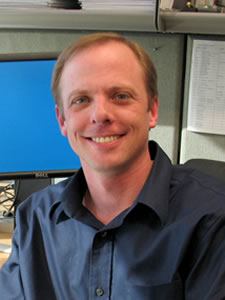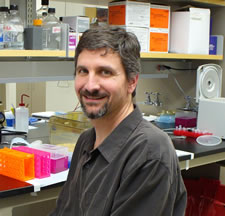|
He is the recipient of several major research grants from the National Institutes of Health, is a former March of Dimes Basil O'Connor Scholar, and an American Cancer Society Research Scholar. In 2009 he became an Early Career Scientist of the Howard Hughes Medical Institute. His research focuses on understanding the structural basis for viral RNA manipulation of host cellular machinery using biophysical, biochemical, and structural methods to include crystallization of folded RNA molecules. His work includes the first quantitative and structural explorations of the binding of the hepatitis C virus internal ribosome entry site RNA to host cell ribosomes. In addition to his research, he teaches both medical and graduate students. He is co-founder of the Colorado Evolution Response Team (CERT), which promotes the rigorous teaching of evolutionary theory in Colorado public school. He has lectured and taught classes at various churches and other community forums in Colorado, Kansas, and Iowa on the topic of evolutionary theory.
Studies to better understand the conditions that foster the initiation of leukemias and lymphomas are currently a major thrust of the lab. The DeGregori lab has developed an evolutionary based model for cancer development, Adaptive Oncogenesis. The lab is currently exploring how reduced stem cell fitness resulting from carcinogen exposure, irradiation, inadequate diet or aging can select for adaptive cancer-causing mutations and thereby promote cancer. Other studies in the lab are geared towards the development of novel therapeutic strategies to treat leukemias and non-small cell lung cancers. James is also a cofounder of CERT (Colorado Evolution Response Team), and has spoken at numerous regional events to promote the importance of teaching evolution. |
|
Over 150 years ago, Charles Darwin presented a theory that explained the origins of the diversity and distribution of life on Earth. Since then, the response to evolutionary theories has followed two widely divergent paths: to many (including scientists) it is the very foundation upon which the biological sciences rest. To many others, it is a dire threat to their religious faith. The ensuing conflict touches upon everything from education to politics. The truth is, there is no reason to be afraid of evolution or to view it as a threat. Quite the opposite, evolutionary theory is being used by scientists everyday to understand and develop new treatments for deadly diseases. Who doesn't want that? At the Café, we plan on discussing: What does evolutionary theory really say, and perhaps more importantly, what does it NOT say? What are the basic processes that drive evolution on Earth? Why is it not really a threat to religion? Why should we fight to have thorough coverage of evolutionary theories in schools (from grade school to Med school)? Why must we understand evolution to better prevent and combat diseases, such as cancer? |

 Jeffrey Kieft graduated in 1990 from the U.S. Military Academy at West Point. As an Army Officer in Germany, he served in the 1st Armored Division as a tank platoon leader, support platoon leader, and battalion logistics officer. He was also nominated by the Army to the NASA astronaut program. Upon leaving active duty, Dr. Kieft earned his Ph.D. from the University of California, Berkeley under the mentorship of Ignacio Tinoco, Jr. He did his postdoctoral research at Yale University in the Lab of Jennifer Doudna. In 2001 he was awarded the Roger Revelle/AAAS Fellowship in Global Stewardship, working as a member of the White House Office of Science and Technology Policy for one year before joining the faculty at the University of Colorado School of Medicine.
Jeffrey Kieft graduated in 1990 from the U.S. Military Academy at West Point. As an Army Officer in Germany, he served in the 1st Armored Division as a tank platoon leader, support platoon leader, and battalion logistics officer. He was also nominated by the Army to the NASA astronaut program. Upon leaving active duty, Dr. Kieft earned his Ph.D. from the University of California, Berkeley under the mentorship of Ignacio Tinoco, Jr. He did his postdoctoral research at Yale University in the Lab of Jennifer Doudna. In 2001 he was awarded the Roger Revelle/AAAS Fellowship in Global Stewardship, working as a member of the White House Office of Science and Technology Policy for one year before joining the faculty at the University of Colorado School of Medicine.  James DeGregori received a B.A. in Microbiology from the University of Texas at Austin in 1987 and a Ph.D. in Biology from the Massachusetts Institute of Technology in Cambridge in 1993. From 1993 to 1997, as a postdoctoral fellow Duke University Medical Center he studied how the E2F transcription factor family controls transcription and cell fate decisions. Since 1997 he has been a faculty member in the Department of Biochemistry and Molecular Genetics at the University of Colorado Medical School.
James DeGregori received a B.A. in Microbiology from the University of Texas at Austin in 1987 and a Ph.D. in Biology from the Massachusetts Institute of Technology in Cambridge in 1993. From 1993 to 1997, as a postdoctoral fellow Duke University Medical Center he studied how the E2F transcription factor family controls transcription and cell fate decisions. Since 1997 he has been a faculty member in the Department of Biochemistry and Molecular Genetics at the University of Colorado Medical School.